 April 2023 in “Authorea (Authorea)”
April 2023 in “Authorea (Authorea)” A young woman with a rare skin cancer was diagnosed late because her symptoms were unusual for the disease.
 4 citations,
January 2019 in “Dermatologic Therapy”
4 citations,
January 2019 in “Dermatologic Therapy” Scalp basal cell carcinoma may be more aggressive and harder to treat than other types, requiring special attention and further research.
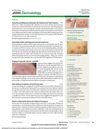 September 2016 in “JAMA Dermatology”
September 2016 in “JAMA Dermatology” Melanoma patients can learn to check their skin, early balding in men may indicate similar risks as PCOS in women, certain criteria can help predict skin cancer behavior, small skin cancer may not need extra therapy after surgery, and sterile gloves don't reduce infection in minor surgeries.
 June 2020 in “Journal of Investigative Dermatology”
June 2020 in “Journal of Investigative Dermatology” More research with diverse participants is needed to determine the effectiveness of photobiomodulation devices for hair loss treatment.
7 citations,
August 2019 in “Journal of Dermatological Treatment” Hydrosurgery is effective, safe, and causes fewer scars and complications than traditional methods.
 238 citations,
July 2003 in “British Journal of Plastic Surgery”
238 citations,
July 2003 in “British Journal of Plastic Surgery” Hidradenitis suppurativa, a chronic skin disease, can be managed with antibiotics, lifestyle changes, and in severe cases, surgery. Early diagnosis and careful planning are key, and laser treatment can be an efficient solution for mild to severe cases.
4 citations,
December 2014 in “Dermatologica sinica/Zhōnghuá pífūkē yīxué zázhì” The excimer lamp is a safe and effective treatment for severe alopecia areata.
4 citations,
January 2019 in “Open Access Macedonian Journal of Medical Sciences” Oral mini-pulse methylprednisolone is an effective and safe treatment for alopecia areata.
 36 citations,
December 2015 in “Drugs”
36 citations,
December 2015 in “Drugs” New treatments for a chronic skin condition show promise, but individualized plans are crucial due to varying responses.
 January 2025 in “Bioengineering”
January 2025 in “Bioengineering” Combining PRS with TAFR is promising for treating complex fistulas, with most patients achieving long-term healing.
 8 citations,
June 2016 in “Journal of Cutaneous Pathology”
8 citations,
June 2016 in “Journal of Cutaneous Pathology” Two women were diagnosed with a rare melanoma that looked like hair loss but was actually a type of skin cancer.
 27 citations,
December 2014 in “Current problems in dermatology”
27 citations,
December 2014 in “Current problems in dermatology” Photodynamic therapy is the preferred treatment for skin precancer due to its effectiveness and safety.
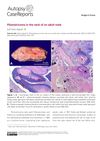 January 2022 in “Autopsy and Case Reports”
January 2022 in “Autopsy and Case Reports” A man had a non-cancerous neck tumor related to hair follicles removed with no return of the tumor.
 7 citations,
October 2022 in “Expert opinion on emerging drugs”
7 citations,
October 2022 in “Expert opinion on emerging drugs” New drugs for alopecia areata show promise but aren't universally effective, and hair loss often returns after stopping treatment.
 3 citations,
April 2016 in “Journal of The American Academy of Dermatology”
3 citations,
April 2016 in “Journal of The American Academy of Dermatology” Hair loss was treated successfully with a special type of laser.
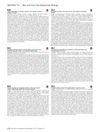 April 2017 in “Journal of Investigative Dermatology”
April 2017 in “Journal of Investigative Dermatology” The hair follicle dermal sheath is essential for hair shedding and needs to communicate with the outer root sheath for normal hair growth cycles.
 22 citations,
August 2015 in “Cochrane Database of Systematic Reviews”
22 citations,
August 2015 in “Cochrane Database of Systematic Reviews” The study aims to find the best treatment for central serous chorioretinopathy by comparing various options.
 October 2021 in “The Egyptian Journal of Hospital Medicine”
October 2021 in “The Egyptian Journal of Hospital Medicine” Platelet-rich plasma is a safe and effective treatment for oral lichen planus.
 April 2017 in “Journal of Investigative Dermatology”
April 2017 in “Journal of Investigative Dermatology” Hair loss patterns differ between males and females due to 5 master regulators and JAK-STAT signaling affects hair growth.
 April 2017 in “Journal of Investigative Dermatology”
April 2017 in “Journal of Investigative Dermatology” PRC1 influences skin stem cell development by both turning genes on and off, affecting hair growth and skin cell types.
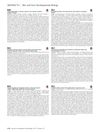 April 2017 in “Journal of Investigative Dermatology”
April 2017 in “Journal of Investigative Dermatology” Sirolimus and propranolol may reduce abnormal cell growth and improve lymphatic malformations in children.
 1 citations,
January 2015 in “Journal of Pigmentary Disorders”
1 citations,
January 2015 in “Journal of Pigmentary Disorders” Treating melasma in men is difficult, especially for the deeper skin layers, and may need more than just topical treatments.
 1 citations,
April 2017 in “Journal of Investigative Dermatology”
1 citations,
April 2017 in “Journal of Investigative Dermatology” D-OCT shows increased blood vessel growth in response to tissue damage in Frontal Fibrosing Alopecia and is useful for diagnosis and monitoring.
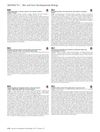 April 2017 in “Journal of Investigative Dermatology”
April 2017 in “Journal of Investigative Dermatology” Blocking JAK-STAT5 signaling in mice leads to hair growth.
 247 citations,
August 2011 in “European Journal of Epidemiology”
247 citations,
August 2011 in “European Journal of Epidemiology” The Rotterdam Study updated its design and objectives in 2012, providing insights into various diseases in the elderly, including skin cancer, bone health, liver disease, neurological and psychiatric conditions, and respiratory issues.
 July 2018 in “Elsevier eBooks”
July 2018 in “Elsevier eBooks” Up to half of people experience itchy scalp, often due to skin conditions like seborrheic dermatitis or psoriasis, and treatments vary based on the specific cause.
January 2024 in “Biomedicines” The review shows that skin symptoms like chronic fungal infections, hair loss, and skin depigmentation are key for early detection and management of APECED.
 July 2019 in “Journal of the Formosan Medical Association”
July 2019 in “Journal of the Formosan Medical Association” Melatonin may help with nerve pain, a hepatitis C drug is effective but has side effects, a treatment for mouth sores works but can cause blood issues, ear reconstruction with an implant is safe, HIV transmission from mother to child in Taiwan is now 0% with treatment, certain blood problems are more common in people with a tongue condition, a gene and being overweight are linked to hair loss in some women, a new technique could reduce radiation for lung nodule patients, a hepatitis treatment may lower cancer recurrence after a procedure, and adding extra screening improves tuberculosis detection in patients with lung infections.
 September 2010 in “European Urology Supplements”
September 2010 in “European Urology Supplements” The document does not confirm if radical prostatectomy is the best treatment for locally advanced prostate cancer.
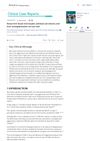 June 2023 in “Clinical Case Reports”
June 2023 in “Clinical Case Reports” Complete surgical removal and regular check-ups are essential for treating a rare skin cancer, and hair transplant can help fix scars from cancer surgery.


























